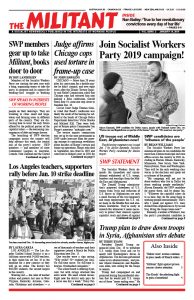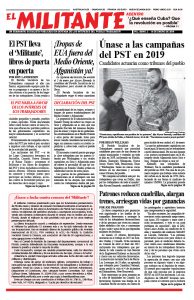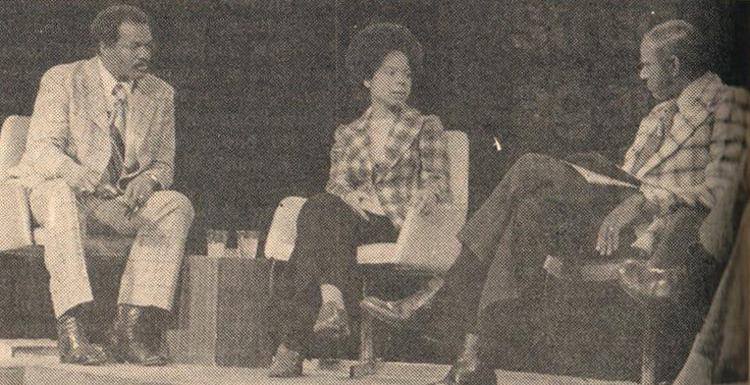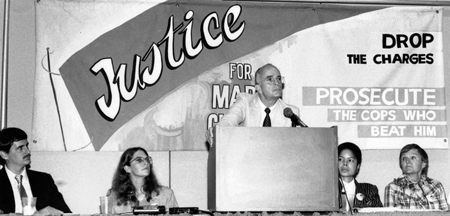
LOS ANGELES—”Selfless, disciplined, and loving to a fault, Nan Bailey remained true to her revolutionary convictions every day of her adult life,” wrote Jack Barnes, national secretary of the Socialist Workers Party, in his message to a celebration of her five decades of building and leading the communist movement. The Dec. 30 event was held at the Japanese American Cultural and Community Center here, in a glass-walled room looking out on a beautiful garden.
Bailey died Dec. 12 at age 66. “Nan knew the party is indispensable to the working-class march to taking political power out of the hands of the brutal U.S. ruling class,” Norton Sandler told the audience, speaking on behalf of the SWP National Committee, the party’s leading body. Bailey served on the National Committee for 18 years. Over her years in the party, she shouldered responsibilities leading its work in strengthening trade unions, in defense of Black rights, in propaganda activity among working people and SWP election campaigns, and on many other fronts.
Among the 100 in attendance were comrades who worked with Bailey for many years, as well as dozens of co-workers, friends, and family members spanning generations, including those of her partner Hector Gomez.
Participants provided food, flowers and beverages, and browsed a display reviewing the political activity Bailey had joined in and helped lead. Some pulled out phones and cameras to photograph the four panels. They looked through booklets of the 20 messages from across the U.S. and other countries.
“I knew she was involved in all these things,” said Morgan Jones, Bailey’s niece from Baltimore, as she pored over the display. “But Nan would never talk about herself.”
“It is impressive all the things she did,” said Bailey’s neighbor Inez Trujillo, who came with her husband Hector and child.
An ‘army brat’
“Nan Bailey was an ‘army brat,’” said Barnes at the opening of his message. With her father a career military man, her family lived abroad for much of her early years.
“She was tough,” Barnes said. “As a small child she was formed as much by Japanese communities she lived in overseas and later, a little bit older, by French communities, as she was by Americans.” That rearing was among the reasons, he said, that Bailey “could not imagine her party not doing political work in the ranks of the armed forces.” (See Barnes’s message, which Sandler read at the meeting, on facing page.)
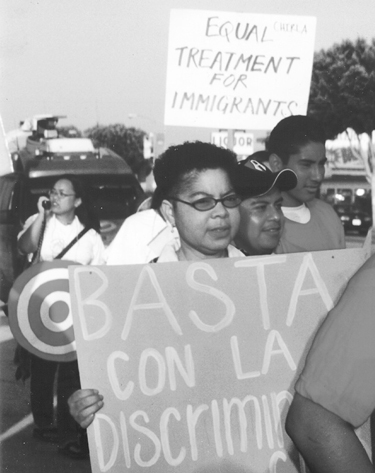
Bailey joined the Young Socialist Alliance in 1970 at Brown University in Providence, Rhode Island, and the Socialist Workers Party soon afterward. Taking advantage of Brown’s “independent study” program and “pass or fail” grading system, she spent most of her four college years building the SWP in Washington, D.C., occasionally returning to Providence.
SWP leader James Harris from Washington, D.C., told the crowd he first met Bailey in 1971 when she was there building the April 24 march against the U.S. rulers’ war in Vietnam, an action that turned out to be well more than half-a-million-strong. “These were exciting times with big events, with a lot of loud and bombastic people,” Harris said. “You could get pushed around and ignored. But not Nan. She was determined to take her place in the movement of the times.”
Bailey debated Marion Barry on TV in 1974 when she was the Socialist Workers Party candidate for mayor of Washington, D.C., Harris said –— one of several times she ran for public office on the SWP ticket. Before federal officials gutted equal-time rules for candidates outside the bosses’ parties in the 1980s, Harris said, “our campaigns got extensive media coverage. People would greet Nan on the street, often telling her what they liked or didn’t like about what she said.”
Bailey was a coordinator for the D.C. Women’s National Abortion Action Coalition. WONAAC organized teach-ins, marches and protests in defense of a woman’s right to choose.
Defense of Black rights
In 1974 federal courts implemented orders to desegregate Boston schools by busing students who were Black to schools in neighborhoods that were predominantly Caucasian. “The ruling was met by big racist mobilizations, aimed at rolling back gains won by Blacks in the 1950s and 1960s and inciting violence against busing plans in other cities,” Harris said. “Opponents of busing demonstrated in the thousands, and thugs stoned buses, often with approval of city authorities.”
This was nothing like today’s false claims of rising “white nationalist” actions, Harris said. “We were mobilizing against real, organized, and large racist violence in the streets.”
“Nan spoke on campuses around the country,” Harris said, “and helped organize the party and YSA as we joined and helped lead the campaign that broke the back of the racist violence. There were mass countermobilizations in Boston and other cities, as well as defense teams on the school buses themselves, with union involvement.”
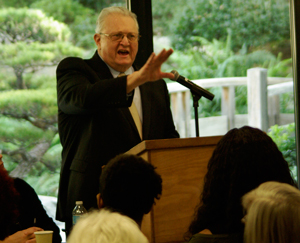
Bailey helped lead the SWP’s participation in the National Black Independent Political Party, founded in 1980 at a conference of 1,500. NBIPP grew out of the proletarian battles that ended Jim Crow segregation, Harris said. It adopted a far-reaching charter to advance the interests of the Black community and beyond, setting an example for all working people of class independence from the capitalist state and parties.
NBIPP organized for a few years before many of its leaders cut and ran under pressure back to the Democratic Party. “Nan always remained objective and calm during those debates, often heated ones,” Harris said.
Building a proletarian party
Mary Martin, a leader of the SWP’s union work today, talked about Bailey’s activity in the late 1990s organizing the party’s Trade Union Committee. While working at an aerospace plant in Seattle organized by the International Association of Machinists, “Nan helped form a women’s committee in the local,” Martin said. “The SWP saw this as a way to strengthen the union, to advance the fight for women’s equality, including in the workplace, and to build the party.”
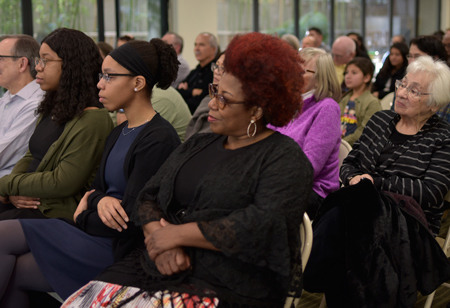
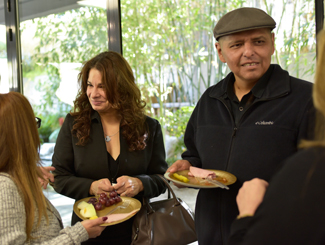 In a victory for both women and men on the job, the committee drew up demands against the company’s draconian attendance policy, which especially victimized women with children and other family responsibilities. “They pushed the company back and won,” she said. The committee also organized a program on domestic violence, attended by hundreds of coworkers.
In a victory for both women and men on the job, the committee drew up demands against the company’s draconian attendance policy, which especially victimized women with children and other family responsibilities. “They pushed the company back and won,” she said. The committee also organized a program on domestic violence, attended by hundreds of coworkers.
In 1999 Bailey led a four-month party campaign to get 1,500 copies of the newly published Capitalism’s World Disorder: Working-Class Politics at the Millennium by Jack Barnes into working people’s hands. The book offers invaluable background to the world capitalist crisis that sharpened in the early 21st century, and a working-class course to fight its consequences for tens of millions.
“The successful party campaign reached working people in cities, small towns and rural areas,” Martin said. SWP members won readers of the book among factory and farmworkers in North Carolina, Mississippi and Virginia; Midwest packinghouse workers; miners in the Appalachian and Western coalfields; dairy farmers in Wisconsin and Pennsylvania; and workers in garment shops and other workplaces from New York to California, Florida to Washington.
Bailey was a staff writer for the Militant in 1980-81. She then took six months off other responsibilities to participate in a leadership school organized by the SWP. Party leaders studied the political writings and activity of the founders of the communist workers movement, Karl Marx and Frederick Engels.
Over the years, Bailey traveled on international assignment for the SWP. She took part in solidarity trips to Grenada during the 1979-83 revolution in that Caribbean island, and to South Africa during the closing stages of the struggle that toppled apartheid. She collaborated with comrades in sister parties during visits to Canada, the United Kingdom, Australia, and New Zealand.
“The impact of these international assignments is captured in messages to the meeting from Communist League leaderships in those countries,” Sandler said. (See excerpts from these and other messages on page 6.)
Injury to one, injury to all
“In 1988, Bailey was working at the Swift meatpacking plant in Des Moines, Iowa,” Sandler said. “One of our party members, Mark Curtis, also a worker at Swift, was arrested, brutally beaten by the cops, and framed up for raping a 15-year-old Black woman.”
The party went into action, Sandler said. It mounted a yearslong defense campaign that won national and international support. “Political forces opposed to Curtis in Des Moines misestimated Nan,” he said. “They foolishly thought she’d back away from Mark’s defense because she was a Black woman. Nan proudly spoke in Mark’s defense, exposing the frame-up and helping win fighters like Edna Griffin, a decadeslong civil rights leader in Iowa, to the defense campaign.”
Bailey also organized the secretariat of the SWP’s central leadership for several years, Sandler said. “Nan was serious about the party’s programmatic conquests and its leadership continuity.”
He read a message from Debbie Lazar, who said she got to know Bailey in 1995, when Bailey was a secretary for SWP leaders Jack Barnes and Mary-Alice Waters. “Over the next several years Nan, more than anyone else, taught me how to be a secretary for the central leadership,” Lazar wrote. “She showed how a competent secretary can help in expanding their reach, worldwide.
“Nan set a tone of dignity, respect, and kindness in the office. She had high work standards and challenged her co-workers to reach,” Lazar said. Bailey taught her “to strive to judge political priorities and not get lost in myriad details.”
“I’m proud of Nan’s contribution to building the communist movement and of those who will follow in her footsteps,” Lazar closed. “Be like Nan!”
Building SWP in Los Angeles
Bailey worked in garment factories in Los Angeles after leaving Seattle in late 1999. Messages from Rachel Wilson in Seattle and Arlene Rubinstein in Washington, D.C., described how Bailey helped train them and other workers in how to sew and get a sewing job. Her efforts to learn Spanish were important in collaborating with co-workers to pass along skills and carry out political activity.
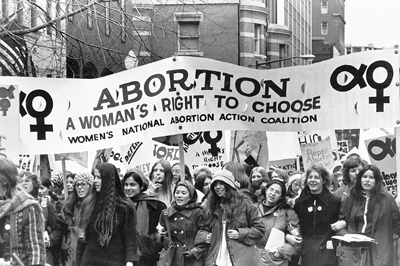
Bailey was forced to curtail her political work the past 15 years, as a degenerative lung disease advanced. She continued taking assignments and participating in SWP meetings as she could. “At meetings of the Los Angeles branch,” Sandler said, “Nan would cut to the heart of questions being debated. Once a decision was made, she understood it was not a suggestion, or a good idea, but an instruction to be carried out with discipline.”
“Nan could be stubborn; that’s an understatement,” said Sandler. “She couldn’t be pushed around politically, or medically.” He described the kind of health care she fought for and got, “extremely unusual in capitalist society for a person like Nan, with little money or other resources.”
“Nan was determined to be in control of her own decisions, right up to the last hours of her life,” Sandler said. He described her many-year battle to obtain a lung transplant. Small in stature, Bailey could only tolerate an adult lung from a similar-sized person. She would be bypassed on the list if she had a cold or other ailment, and it would take her months, sometimes years, to requalify.
No longer able to work in industry, Bailey got jobs editing resumes and postgraduate papers. Having paid attention her whole life to conditions in U.S. prisons, she excelled at crafting resumes to help ex-inmates get jobs, James Harris said. “Members of the party in L.A. would sometimes meet one of these people in factories where we worked,” he said — “workers who owed their jobs and livelihood, in part, to help from Nan.”
Celia Garza-Halstead, a nurse practitioner and close friend of Nan’s, spoke at the event. To boisterous laughter, she described how Bailey would calm her down when she was under deadline pressure for a school thesis she was writing and Bailey was editing.
Garza-Halstead also described the aid Bailey provided to Nestor Santana, a young Guatemalan-born worker, in securing a prosthesis after losing a leg in a train accident. Today a skilled sample-making garment worker, Santana attended the celebration and explained after the program how Bailey had helped him learn to sew following the accident.
Those who knew Nan “can give hundreds of examples” of such kindness, Barnes said in his message. And they were “always done with the absence of any obligation on the part of the recipient, other than to be yourself and to enjoy.”
Sandler concluded the meeting by urging participants to contribute to the party that Bailey dedicated her life to. Over $4,000 was raised to help advance the work of the Socialist Workers Party.
